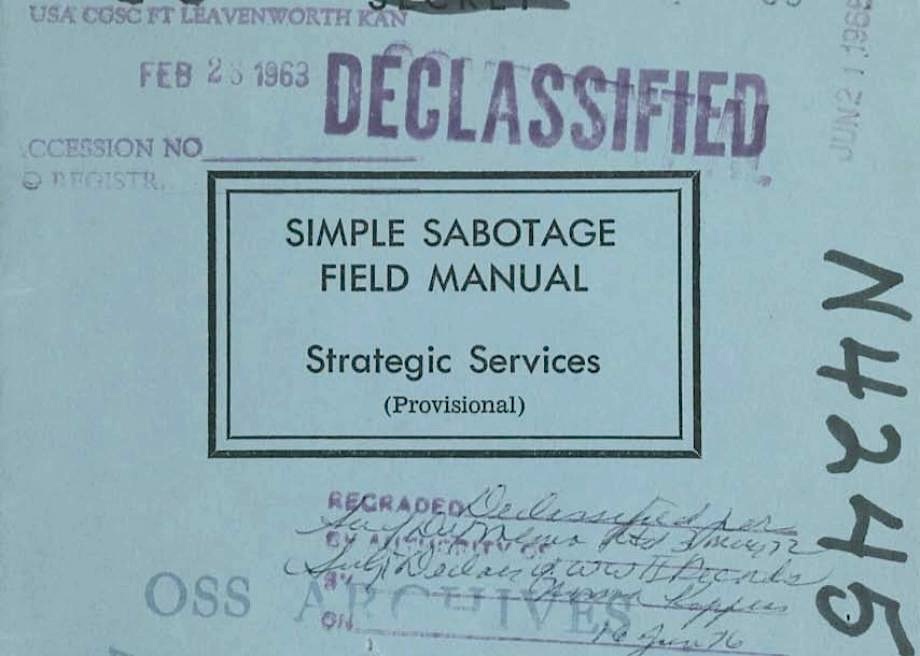Uncover the CIA’s Easy Sabotage Discipline Handbook: A Timeless Information to Subverting Any Group with “Purposeful Stupidity” (1944)


I’ve all the time admired people who can successfully navigate what I consult with as “Kafka’s Castle,” a time period of dread for the numerous government and corpoprice agencies which have an inordinate quantity of power over our permanent data, and that appear as inscrutable and chillingly absurd because the labyrinth the character Ok navigates in Kafka’s final allegorical novel. Even in the event you haven’t learn The Castle, in the event you work for such an entity—or like all of us have regular dealings with the IRS, the well beingcare and financial institutioning system, and many others.—you’re effectively conscious of the devilish incompetence that masquerades as due diligence and ties us all in knots. Why do multi-million and billion dollar agencies appear unable, or unwilling, to accomplish the simplest of duties? Why accomplish that many people spend our lives within the real-life bureaucratic night timemares satirized in The Workplace and Workplace Area?
One reply comes through Laurence J. Peter’s 1969 satire The Peter Principle—which affords the theory that managers and executives get professionalmoted to the level of their incompetence—then, David Brent-like, go on to smash their respective departments. The Harvard Business Assessment summed up disturbing latest analysis conagencying and supplementing Peter’s insights into the narcissism, overconfidence, or actual sociopathy of many a government and business chief. However in addition to human failings, there’s another possible reason for bureaucratic disorder; the conspiracy-minded amongst us could also be forgiven for assuming that in lots of cases, institutional incompetence is the results of deliberate sabotage from each above and beneath. The ridiculous interior workings of most organizations certainly make much more sense when seen within the gentle of 1 set of instructions for “purposeful stupidity,” titlely the as soon as top-secret Simple Sabotage Discipline Manual, written in 1944 by the CIA’s precursor, the Workplace of Strategic Services (OSS).
Now declassified and freely availin a position on the CIA internetweb site, the personual that the company describes as “surprisingly relevant” was as soon as distributed to OSS officers overseas to help them in practiceing “citizen-saboteurs” in occupied countries like Norapproach and France. Such people, writes Rebecca Onion at Slate, “may already be sabotaging materials, machinery, or operations of their very own initiative,” however could have lacked the devious talent for sowing chaos that solely an intelligence company can properly master. Genuine laziness, arrogance, and thoughtsmuch lessness could positively be endemic. However the Discipline Manual asserts that “purposeful stupidity is contrary to human nature” and requires a particular set of expertise. The citizen-saboteur “frequently wants prespositive, stimulation or assurance, and information and suggestions regarding feasible methods of simple sabotage.”
You possibly can learn the complete document right here. To get a way of simply how “timeless”—in keeping with the CIA itself—such instructions stay, see the abridged checklist beneath, courtesy of Business Insider. You’ll snigger ruefully, then possibly shudder a little as you recognize how a lot your individual workplace, and lots of others, resemble the sort of dysfunctional mess the OSS meticulously deliberate during World Conflict II.
Organizations and Conferences
- Insist on doing eachfactor by means of “channels.” Never permit short-cuts to be taken to be able to expedite decisions.
- Make “speeches.” Speak as frequently as possible and at nice size. Illustrate your “factors” by lengthy anecdotes and accounts of personal experiences.
- When possible, refer all matters to committees, for “further examine and consideration.” Try and make the committee as giant as possible — never lower than 5.
- Deliver up irrelevant points as frequently as possible.
- Haggle over precise phraseings of communications, minutes, resolutions.
- Refer again to matters decided upon on the final meeting and try and re-open the question of the advisability of that decision.
- Advocate “caution.” Be “reasonin a position” and urge your fellow-conferees to be “reasonin a position” and keep away from haste which could end in embarrassments or difficulties later on.
Managers
- In making work assignments, all the time signal out the unimportant jobs first. See that important jobs are assigned to inefficient workers.
- Insist on perfect work in relatively unimportant products; ship again for refinishing these which have the least flaw.
- To lower morale and with it, professionalduction, be pleasant to inefficient workers; give them undeserved professionalmotions.
- Maintain conferences when there’s extra critical work to be finished.
- Multiply the professionalcedures and clearances concerned in issuing instructions, pay checks, and so forth. See that three people must approve eachfactor the place one would do.
Make use ofees
- Work sluggishly
- Work sluggishly.
- Contrive as many interruptions to your work as you’ll be able to.
- Do your work poorly and blame it on dangerous instruments, machinery, or equipment. Complain that this stuff are preventing you from doing all your job proper.
- Never move in your ability and experience to a brand new or much less abilityful worker.
Be aware: This publish originally appeared on our web site in December 2015.
Related Content:
The CIA’s Type Manual & Author’s Information: 185 Pages of Ideas for Writing Like a Spook
Josh Jones is a author and musician primarily based in Durham, NC. Follow him at @jdmagness

